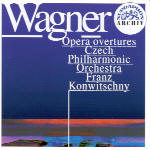These Wagner performances sound a bit dated now (they come from 1960), but feature lively performances in that sensible, musicianly, middle-of-the-road German tradition of which Konwitschny was a typical representative. The bright, wiry tones of the Czech Philharmonic really add something distinctive to the proceedings: the opening of the overture to The Flying Dutchman, for example, benefits immeasurably from the way the trumpets “bite” in the opening measures. The Meistersinger prelude gains considerably in contrapuntal clarity from the orchestra’s non-blended sonority, and Tannhäuser compensates, in additional energy, for what it may lose in burnished nobility. Only the Tristan prelude lacks a certain warmth and sensuality. The performance of Till Eulenspiegel, excellently preserved in clear (if not noise-free) 1952 mono, is pretty wonderful, those Czech winds making something truly hilarious out of a piece that often sounds more annoying than funny. In sum: this disc offers a winning sample of Konwitschny’s art, and another fine memento of a great period in the history of this excellent orchestra.
































